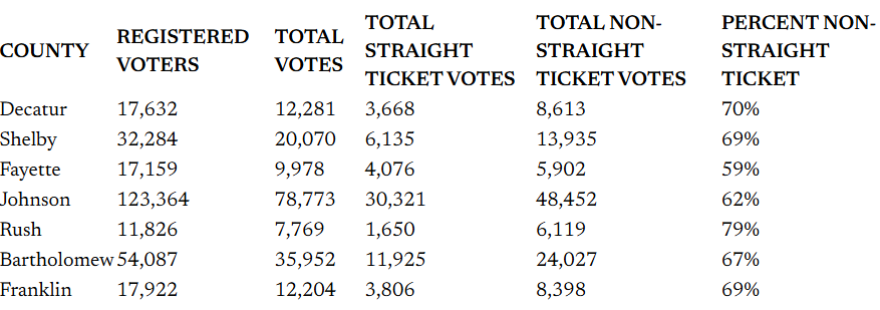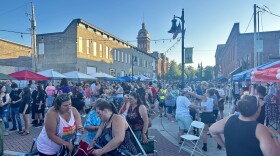Since Jan. 20, organizations such as No Kings and 50501 have mobilized, holding regular protests against the second Trump administration.
But big cities like Indianapolis and Fort Wayne aren’t the only communities where Hoosiers are exercising their First Amendment rights. People are gathering in Columbus, Batesville, Oldenburg, Franklin, Decatur and other small cities, towns and counties.
This Saturday will once again bring a cascade of events around the state for the latest coordinated event. About 40 No Kings protests are planned for Indiana, from Albion to Vincennes.
“I feel like a lot of people” who lean left, “and live somewhere like this, they may feel alone,” said Columbus resident Raven Stanton.
Stanton has organized several protests across Indiana and co-founded Rise Up Columbus. While she’s now considered a seasoned organizer, she didn’t get started until January.
“I got online, found a couple Discord servers and connected with a handful of people locally,” she said. From there her involvement grew.
I’m just not going to be silent. That was the problem in World War II — people stood by and did nothing.Sister Noella Poinsette
The current political situation motivated her actions.
“The things that they’re attempting to do — the systematic removal of marginalized groups’ rights,” Stanton said. “Their attempt at silencing journalists and other people and attempting to eradicate the First Amendment — that’s just the tip of the iceberg in terms of everything they’ve been able to accomplish in seven to eight months’ time.”
Hollie Payton, co-founder of Decatur County-based RISE for Justice, echoed similar sentiments.
“I felt with all the negativity going on, just to lend that ear, that piece of hope to people,” is important, she said, as is letting people know that while everyone is different, “we all deserve equal rights.”
Attorney and Indiana House District 55 Democratic candidate Victoria Martz has attended as many protests as possible. She got involved this spring after contacting another organizer in Decatur County, asking if she could speak at their protest.
“I really wanted to talk to the people about what’s going on,” she said. “Everybody was having a difficult time coping with the fast-paced attacks on our constitutional rights, on our social service programs.”
She wanted to remind protestors that “it’s not the end — we’re in this together still and if we keep working together collectively, we can eventually, in time, change things. I still have faith in that.”
The Oldenburg Sisters of Saint Francis have participated in local and national protests, including the June 28 Sisters Speak Out protest in Washington D.C. Sister Noella Poinsette also attended a protest at Camp Atterbury.
Poinsette explained the Sisters’ involvement: “Saint Francis was all about the poor, just like Jesus. In the gospel — well, the gospel and the Old Testament, even — God says to care for the orphan, the widow and the stranger. Jesus was all about including everyone.”
Indiana 50501 — which disbanded in August — was organizing protests in Indianapolis. It stood for 50 protests, 50 states, 1 movement and has similar chapters nationwide. When contacted for comment, former leader Scott Johnson stated, “There were some people in the group that had some issue with me personally.”
Johnson viewed his work as “servant-style leadership” and stepped down voluntarily. “I honestly don’t know who’s in charge or what they’re doing,” he said regarding the current status of Indiana 50501. The Indiana 50501 website homepage states that “the original Indiana 50501 has disbanded,” and lists groups continuing the original organization’s work.
The Sisters value justice and individual dignity. Participating in protests is how they speak out for those who can’t.
“Maybe workers have a hard time speaking out for just wages because they need to be at work,” Poinsette said. “The immigrants right now, in this climate, are afraid to leave their homes sometimes. We’re just speaking up like the prophets in the Old Testament, trying to bring people back to an awareness of God.”
Rural protests don’t draw the same numbers as those at the Statehouse. For instance, a No Kings rally in May drew more than 3,000 to the state’s capital. Some of the other protests draw dozens to more than a hundred.
Martz described people who drive past protests in small communities as mostly positive.
“They’re honking their horns, doing like a cheering fist or waving, things that show they’re happy to see this going on,” she said. But there are some people “who drive by and they’re throwing up the middle finger or yelling ‘Trump won.’ Nobody said he didn’t win. We’re just saying we don’t like authoritarianism.”
While helping organize a protest in Batesville, Martz was responsible for coordinating with local law enforcement. That communication paid off because, at this protest, there was an incident. Martz and her group were walking from downtown Batesville to another area to listen to a speaker. While walking, a truck with two large Trump flags kept driving ahead of the group. The driver was yelling at protestors.
The group approached an intersection and the truck pulled up to the stop sign. The group had previously informed the police chief they wouldn’t obstruct traffic. Organizers reminded protestors to let traffic pass. The truck wouldn’t move, even as other cars approached and waited.
“We were not going to cross the street,” Martz said, “because I was afraid of what could happen if we crossed in front of this truck that already made it clear he wasn’t liking what we’re there to stand for.”
The truck began slowly rolling through the intersection, the driver still yelling at the group. Two protestors approached, Martz said, yelling back, while she reminded others to remain on the sidewalk.
“As I’m doing that,” she recounts, “a white truck pulls up — facing the opposite direction. It flips on its lights and it’s the police chief. He rolled down his window,” telling the truck’s driver he was blocking traffic.
“He made the truck move,” Martz said, “and de-escalated the situation alongside me.”
The group was able to cross and listen to their speaker. The moment stood out, said Martz, because it showed everybody, “your community, while it might not be a straight Democratic community, a good community can have people of all political identities and backgrounds who stand behind each other.”

In Greensburg, Payton encountered locals and people from nearby communities at protests. One woman, who had never attended a protest before, went on to attend multiple.
“That just solidified the purpose of our movement,” Payton said, “letting people know that what we feel is going on in this country, state, is wrong and we can voice our opinion in a non-violent manner and build community.”
Stanton observed she’s seen “more flak, negative flak, online than I ever have in-person,” at protests she’s organized.
For the Sisters of Saint Francis, reactions have been positive.
“People are really glad that we, as women, religious sisters, are out there voicing their values and concerns. Naturally, there have been some who are opposed to it,” Poinsette said.
Beyond protesting, the Sisters have displayed banners on their front lawn since 2019, including a “Black Lives Matter” banner. Another time, the banner welcomed refugees and immigrants.
Despite some negative encounters, Martz believes protesting is powerful, “even if we’re not changing minds of people who are very set on what they believe.” It ensures people who are upset with what’s going on feel less alone, she said.
“Just because we live in an area represented by Republicans doesn’t mean everybody out here is a Republican,” Martz added, noting rural Indiana isn’t a monolith.
She estimated approximately 40% of District 55 and Batesville vote independent, rather than a straight Democrat or Republican ticket.
General Election turnout figures from 2024 show many voters in the following rural and suburban Indiana counties are not voting straight-ticket.

Besides raising awareness many groups hold collection drives at protests to give back. Stanton collects food and hygiene products at her protests to “give something tangible” to the community. Martz and her fellow organizers have tried to include food drives at every protest to ensure “we’re giving back,” especially as social safety net programs are cut.
“Nothing will be any different if we don’t take action,” Poinsette said, when asked what she felt has been achieved via protesting.
Paraphrasing activist and Holocaust survivor Elie Wiesel, she added, “Silence only benefits the oppressor. If I am silent, I’m saying it’s okay that ICE is acting the way they’re acting and it’s not okay. I don’t want all this. I don’t want health care ending. What the Republicans are doing, in cutting money for Medicaid, is going to be the end of a good number of rural hospitals. All the money through (the One Big Beautiful Bill Act) that they’ve given to the ultra-rich and programs they’re taking away from ordinary people; all of that is wrong. It’s against the gospel, it’s against what God wants for each of us.
“I’m not going to just be quiet and let that happen,” Poinsette said. “I’m only one person but it’s not going to happen. I’m not going to act like I’m okay with it. Whether anything happens because of this — I’m just not going to be silent. That was the problem in World War II — people stood by and did nothing.”
Indiana Capital Chronicle is part of States Newsroom, a nonprofit news network supported by grants and a coalition of donors as a 501c(3) public charity. Indiana Capital Chronicle maintains editorial independence. Contact Editor Niki Kelly for questions: info@indianacapitalchronicle.com.




